Updated on April 21, 2024

Getting parents into assisted living can be challenging and emotionally fraught. It’s a delicate balance between respecting their independence and ensuring their well-being. Here, we provide a guide to ease this transition, find a caring community, and ultimately find peace in your decision.
Recognizing the Need for Assisted Living
Admitting that your parents may need additional assistance can often be the most challenging step of the process. Start by paying close attention to their daily routines and habits.
Are they finding regular tasks such as cooking or cleaning increasingly difficult? Are they isolating themselves or facing medical problems that need more specialized care?
If you notice frequent mishaps or an uptick in forgetfulness, these could be signs that extra help might be beneficial. Consulting with healthcare professionals, such as their primary care physician or a social worker, can also offer valuable perspectives on the level of care your parents may need and guide you towards appropriate solutions.
Exploring the Options Available
Once you have acknowledged the need for an assisted living facility, it’s crucial to take time to sift through the options at your disposal. Research is key in this phase. Look for facilities within your preferred location, and take a deep dive into what they offer.
Are they within your budget? What are their payment policies? How comprehensive is the care they provide?
Take the initiative to visit these places personally. During your tour, interact with the staff, observe the overall environment, and get a feel of the place. Make sure to come prepared with a list of pertinent questions. These could range from the staff’s qualifications to the types of activities they organize for their residents.
Look beyond the basic amenities. Check out the social, cultural, and recreational opportunities they provide. You’re not just looking for a place where your parents will be taken care of; you want a place where they can continue to live enriching lives.
Initiating the Conversation
The dialogue about moving to an assisted living facility is often a touchy subject. When raising this topic with your parents, it’s crucial to approach it with sensitivity and understanding.
Highlight the positives of this decision and assure them that your support will be unwavering throughout this journey. Remember that the decisions being made will directly impact their lives, so their feelings, worries, and inputs must be given proper consideration.
To make it a more open and relaxed discussion, you may include other family members, their primary care physician, or a trusted friend in the conversation.
However, be prepared for resistance or emotional responses. Patience and understanding, while providing reassurances, can help soften any adverse reactions and make the transition smoother.
Planning the Transition
Begin by identifying which personal belongings your parents wish to take along to their new residence. If the new space is smaller, it may require downsizing.
Make it a point to be hands-on with the administrative procedures. This involves making sure that all necessary medical documents are transferred to the new healthcare team. Coordination with the facility’s staff during this time is crucial to ensure everything is in place. It’s also important to arrange reliable transportation for moving day, ensuring it’s as smooth and comfortable as possible for your parents.
Meticulous planning is key.
Navigating the First Few Weeks
In the initial weeks following the move, ensure your parents are becoming acclimated and participating in facility activities. Regular communication is essential during this period. By keeping the lines open, your parents can express any concerns or share positive experiences, enabling you to assess their adjustment progress.
Touch base with the facility’s staff frequently as well, as they can provide insights into your parents’ daily routines and interactions within the community. Encourage your parents to express their feelings and reassure them that it’s normal to need time to settle in.
Finding Peace in the Decision
Feeling a sense of tranquility with your decision is crucial as you help your parents transition into assisted living. It’s quite common to experience feelings of uncertainty or guilt. However, bear in mind that you embarked on this journey guided by love and a deep concern for your parents’ welfare. With time, as you witness your parents adapting to their new surroundings and receiving the care they need, you will find assurance in your choice.
What should I do if my parent is resistant to the idea of moving into assisted living?
Resistance is quite common and understandable. Begin by empathizing with their feelings and offering reassurance about your shared goals: their safety, comfort, and well-being. When presenting your reasons, focus on the positives that this transition can bring, such as increased social interactions, professional care, and relief from chores or maintenance. Allow them to voice their concerns. Their fears may stem from misconceptions, which you can address by providing factual information about assisted living facilities. Also, consider involving trusted individuals who can support your views, such as their physician or friends who have had positive experiences with assisted living. If resistance persists, you may wish to explore transitional options, such as respite care or a trial stay, to help ease them into the new lifestyle gradually.
How do I evaluate different assisted living facilities to find the best fit for my parent’s needs?
Firstly, define your parent’s needs. Are they more in need of social interaction, or do they require significant medical support? Secondly, assess the level of care provided. Some facilities offer minimal assistance with daily activities, while others offer comprehensive medical and personal care. Thirdly, consider the staff’s training and qualifications. A facility with highly trained and compassionate staff is crucial to ensure your parents are treated with dignity and respect. Finally, pay attention to the environment and culture of the facility. Make sure it’s clean, safe, and encourages a sense of community.
What are some signs that it might be time to consider assisted living for a parent?
Signs that it may be time for assisted living can include noticeable shifts in your parent’s behavior or abilities. These can include struggling with routine activities such as bathing, dressing, or managing medications. Unusual forgetfulness, frequent falls, poor nutrition, or unexplained weight loss are also red flags. Other indicators might be a noticeable decline in the cleanliness of their home or appearance, withdrawal from social activities, or increased mood swings. If these signs are present, it might be time to discuss the option of assisted living.
Conclusion
Transitioning parents into assisted living is a journey that requires patience, understanding, and love. It’s about ensuring their safety and comfort while respecting their independence. With careful consideration, open dialogue, and meticulous planning, you can help your parents embrace this new chapter of their life. Take heart in knowing you’re not alone in this journey, and in the end, seeing your parents well-cared for and content in their new home will affirm the love and thoughtfulness that guided your decisions
Your Centre for Compassionate and Tailored Disability Support
At Centre Disability Support, we offer tailored support services for individuals with disabilities throughout Australia. Whether you’re seeking support for yourself, a loved one, or simply wish to learn more about our services, we’re here to help.
We offer housing options in Logan, Ipswich and Brisbane areas, where we provide independent supported living or assist individuals in finding suitable options for individualised living.
Additionally, we provide day-to-day support for individuals with mental health issues, complex behaviour and other types of disabilities. We also have support coordinators available to assist you with planning, navigating your NDIS plans, and offering casework support.
RELATED
What Makes You Eligible For Assisted Living?
Does Your Mum Need Assisted Living or a Nursing Home?
Independent Living vs Assisted Living



